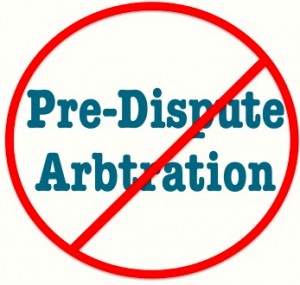 Effective immediately, companies who want to bid on federal contracts valued at $1M+ can no longer require their employees or independent contractors to waive their right to a jury trial for discrimination, harassment or sexual assault claims.
Effective immediately, companies who want to bid on federal contracts valued at $1M+ can no longer require their employees or independent contractors to waive their right to a jury trial for discrimination, harassment or sexual assault claims.
On July 31, 2014, President Obama signed an Executive Order that, among other things, prohibits employers with federal contracts in excess of $1 million (except for contracts for commercially available off-the-shelf items) from requiring their employees or independent contractors to waive their right to a jury trial and agree to arbitrate a dispute before it arises if it involves a claim arising under title VII of the Civil Rights Act of 1964 or any tort related to or arising out of sexual assault or harassment. Under the President’s Executive Order, agreements to arbitrate those types of claim are only enforceable if the employee or independent contractor agrees to waive his or her right to a jury trial and go to arbitration if the agreement is made after the dispute arises.
The Executive Order also applies to employers who are federal subcontractors if the estimated value of the supplies acquired and services provided by the subcontractor exceeds $1 million.
There are two limited exceptions to the pre-dispute arbitration prohibition:
- It does not apply to employees employed pursuant to collective bargaining agreements.
- It does not to any employees or independent contractors “who entered into a valid contract to arbitrate prior to the contractor or subcontractor bidding on a contract covered by this order,” unless the contractor is permitted to change the terms of the mandatory arbitration agreement or the agreement is later renegotiated or replaced.
Implications for Employers
Employers with plans to bid on federal contracts of $1M+ should evaluate any existing or contemplated arbitration agreements to determine whether they are in compliance with this Executive Order.
As it relates to the prohibition against pre-dispute mandatory arbitration, this Executive Order is, for all intents and purposes, effective immediately. I say this because although the Executive Order calls for the Federal Acquisition Regulation (“FAR”) Council and Secretary of Labor to provide further guidance on the new obligations set forth in the Executive Order, it is unlikely that the prohibition against pre-dispute arbitration agreements will be materially impacted.
For readers interested in learning more, I’ve provided below the relevant excerpts from the Executive Order and accompanying Fact Sheet issued by the White House as well as links to the full documents.
Relevant Excerpts from the Executive Order and Accompanying Fact Sheet Issued by the White House
Executive Order
Here is the excerpt from the Executive Order relative to the prohibition against pre-dispute arbitration agreements. The full Executive Order can be read by clicking here.
Sec. 6. Complaint and Dispute Transparency. (a) Agencies shall ensure that for all contracts where the estimated value of the supplies acquired and services required exceeds $1 million, provisions in solicitations and clauses in contracts shall provide that contractors agree that the decision to arbitrate claims arising under title VII of the Civil Rights Act of 1964 or any tort related to or arising out of sexual assault or harassment may only be made with the voluntary consent of employees or independent contractors after such disputes arise. Agencies shall also require that contractors incorporate this same requirement into subcontracts where the estimated value of the supplies acquired and services required exceeds $1 million.
(b) Subsection (a) of this section shall not apply to contracts or subcontracts for the acquisition of commercial items or commercially available off-the-shelf items.
(c) A contractor’s or subcontractor’s agreement under subsection (a) of this section to arbitrate certain claims only with the voluntary post-dispute consent of employees or independent contractors shall not apply with respect to:
(i) employees who are covered by any type of collective bargaining agreement negotiated between the contractor and a labor organization representing them; or
(ii) employees or independent contractors who entered into a valid contract to arbitrate prior to the contractor or subcontractor bidding on a contract covered by this order, except that a contractor’s or subcontractor’s agreement under subsection (a) of this section to arbitrate certain claims only with the voluntary post-dispute consent of employees or independent contractors shall apply if the contractor or subcontractor is permitted to change the terms of the contract with the employee or independent contractor, or when the contract is renegotiated or replaced.
Fact Sheet
Here is the excerpt from the Fact Sheet issued by the White House relative to the prohibition against pre-dispute arbitration agreements. The full Fact Sheet can be read by clicking here.
Give Employees a Day in Court: The Executive Order directs companies with federal contracts of $1 million or more not to require their employees to enter into predispute arbitration agreements for disputes arising out of Title VII of the Civil Rights Act or from torts related to sexual assault or harassment (except when valid contracts already exist). This builds on a policy already passed by Congress and successfully implemented at the Department of Defense, the largest federal contracting agency, and will help improve contractors’ compliance with labor laws.
Part of the basic American bargain is that if you take responsibility, work hard and play by the rules, workers can count on fair wages, freedom from discrimination on the job, and safe and equitable workplaces. Taxpayer dollars shouldn’t be used by unscrupulous employers to drive down living standards for our families, neighbors, and communities. By creating incentives for better compliance and a process for helping contractors come into compliance with basic workplace protection laws, the Executive Order is basic good government that will increase efficiency in federal contracting and will help strengthen our workforce and our economy.
